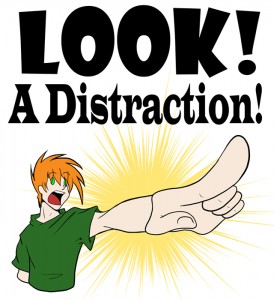 Apparently you can’t repeal the Fairness Doctrine too many times over at the Federal Communications Commission. Today FCC Chair Julius Genachowski announced that the policy, which the agency dumped in the 1980s, needs to be scotched yet again.
Apparently you can’t repeal the Fairness Doctrine too many times over at the Federal Communications Commission. Today FCC Chair Julius Genachowski announced that the policy, which the agency dumped in the 1980s, needs to be scotched yet again.
An “unnecessary distriction,” Genachowski called the Fairness Doctrine, which “holds the potential to chill free speech and the free flow of ideas and was properly abandoned over two decades ago. I am pleased we are removing these and other obsolete rules from our books.”
Killing the Fairness Doctrine twice? You’re confused, right? Ok. First here’s the technical legal reason why the FCC says it is doing this; then the political reason.
Legal
The FCC enforced “The Doctrine” from the late 1940s through the early 1980s. The agency, not Congress, created the rule. It said that broadcasters had to provide reasonable opportunity for contrasting points of view. In the early 1980s the FCC concluded that the policy (which, in fact, was rarely enforced) was having a “chilling effect” on broadcasters, and let it go. Then Congress tried to restore it several times, but these efforts were vetoed by Presidents Reagan and the first President Bush.
But even though the Commission stopped enforcing the regulation, it left the following sentence on its rule books:
The Fairness Doctrine is contained in section 315(a) of the Communications Act of 1934, as amended, which provides that broadcasters have certain obligations to afford reasonable opportunity for the discussion of conflicting views on issues of public importance.
Section 315(a) covers broadcasters obligations to political candidates. It says that if radio and TV station licensees offer air time to any given political candidate, they have to offer “equal opportunities” to other candidates, except when it comes to news stories. BUT, the section adds:
Nothing in the foregoing sentence shall be construed as relieving broadcasters, in connection with the presentation of newscasts, news interviews, news documentaries, and on-the-spot coverage of news events, from the obligation imposed upon them under this Act to operate in the public interest and to afford reasonable opportunity for the discussion of conflicting views of issues of public importance.
A long debate ensued over whether this enshrined the Fairness Doctrine into Federal law. In 1985 the agency concluded that it did not. Two years later the FCC vote to retire the policy.
Political
For the last five years, however, liberals have periodically made noises about bringing The Doctrine back, and conservatives have called these moves a demonic plot to censor Rush Limbaugh and Glenn Beck and similar notables. In the past I’ve referred to these episodes as Fairness Doctrine Panics.
So finally, in a recent report on media, the FCC hinted that it was going to make it clear once and for all that the Fairness Doctrine is over-croaked-dead-yes-way-for-real. “It is unclear why the Commission did not eliminate this when it repealed the Fairness Doctrine policy,” the survey noted. “The sentence has no force of law or policy import, but, it should be said, the language remains ‘on the books’.”
Now it, and 82 other “outdated and obsolete media-related rules” have been dumped, Genachowski pledged.
“The elimination of the obsolete Fairness Doctrine regulations will remove an unnecessary distraction,” his press statement added. “As I have said, striking this from our books ensures there can be no mistake that what has long been a dead letter remains dead.”
Sorry Julius. The Fairness Doctrine will never end in the mind of demogogues. Any FCC rule that appears to even the playing field for ordinary radio listeners and TV watchers, community broadcasters, web and application developers, or consumers will somehow be construed as the Fairness Doctrine from now until the day that our sun turns into a red dwarf.
Localism rules, net neutrality rules, even tax increases—they’re all the Fairness Doctrine now, a necessary and even indispensable distraction. The Doctrine has become an intricate part of our conspiracy theory culture. You can count on this. You can even put it on your books.


